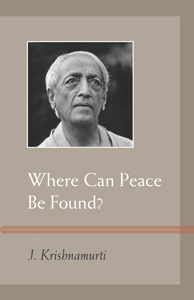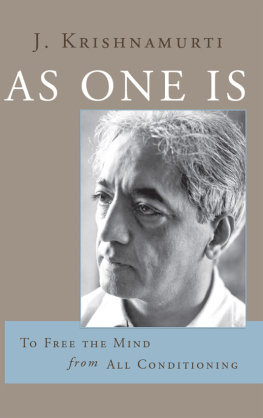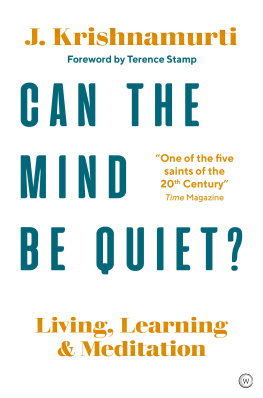Krishnamurti - On Mind and Thought
Here you can read online Krishnamurti - On Mind and Thought full text of the book (entire story) in english for free. Download pdf and epub, get meaning, cover and reviews about this ebook. publisher: HarperSanFrancisco, genre: Religion. Description of the work, (preface) as well as reviews are available. Best literature library LitArk.com created for fans of good reading and offers a wide selection of genres:
Romance novel
Science fiction
Adventure
Detective
Science
History
Home and family
Prose
Art
Politics
Computer
Non-fiction
Religion
Business
Children
Humor
Choose a favorite category and find really read worthwhile books. Enjoy immersion in the world of imagination, feel the emotions of the characters or learn something new for yourself, make an fascinating discovery.

- Book:On Mind and Thought
- Author:
- Publisher:HarperSanFrancisco
- Genre:
- Rating:3 / 5
- Favourites:Add to favourites
- Your mark:
- 60
- 1
- 2
- 3
- 4
- 5
On Mind and Thought: summary, description and annotation
We offer to read an annotation, description, summary or preface (depends on what the author of the book "On Mind and Thought" wrote himself). If you haven't found the necessary information about the book — write in the comments, we will try to find it.
On Mind and Thought — read online for free the complete book (whole text) full work
Below is the text of the book, divided by pages. System saving the place of the last page read, allows you to conveniently read the book "On Mind and Thought" online for free, without having to search again every time where you left off. Put a bookmark, and you can go to the page where you finished reading at any time.
Font size:
Interval:
Bookmark:
On Mind and Thought
Copyright 1993 by Krishnamurti Foundation Trust Ltd. and Krishnamurti Foundation of America
On Mind and Thought
J. Krishnamurti
Intelligence is not the clever pursuit of argument, of opposing contradictions, opinionsas though through opinions truth can be found, which is impossiblebut it is to realize that the activity of thought, with all its capacities, subtleties and extraordinary ceaseless activity, is not intelligence.
Brockwood Park, 4 September 1982
Contents
Foreword
J IDDU K RISHNAMURTI was born in India in 1895 and, at the age of thirteen, was taken up by the Theosophical Society, which considered him to be the vehicle for the world teacher whose advent it had been proclaiming. Krishnamurti was soon to emerge as a powerful, uncompromising, and unclassifiable teacher, whose talks and writings were not linked to any specific religion and were of neither the East nor the West but for the whole world. Firmly repudiating the messianic image, in 1929 he dramatically dissolved the large and monied organization that had been built around him and declared truth to be a pathless land, which could not be approached by any formalized religion, philosophy, or sect.
For the rest of his life Krishnamurti insistently rejected the guru status that others tried to foist upon him. He continued to attract large audiences throughout the world but claimed no authority, wanted no disciples, and spoke always as one individual to another. At the core of his teaching was the realization that fundamental changes in society can be brought about only by a transformation of individual consciousness. The need for self-knowledge and understanding of the restrictive, separative influences of religious and nationalistic conditionings was constantly stressed. Krishnamurti pointed always to the urgent need for openness, for that vast space in the brain in which there is unimaginable energy. This seems to have been the wellspring of his own creativity and the key to his catalytic impact on such a wide variety of people.
He continued to speak all over the world until he died in 1986 at the age of ninety. His talks and dialogues, journals and letters have been preserved in over sixty books and hundreds of recordings. From that vast body of teachings this series of theme books has been compiled. Each book focuses on an issue that has particular relevance to and urgency in our daily lives.
Seattle, 23 July 1950
Thought is never new, but relationship is always new; and thought approaches this thing that is vital, real, new, with the background of the old. That is, thought tries to understand relationship according to the memories, patterns, and conditioning of the oldand hence there is conflict. Before we can understand relationship, we must understand the background of the thinker, which is to be aware of the whole process of thought without choice; that is, we must be capable of seeing things as they are without translating them according to our memories, our preconceived ideas, which are the outcome of past conditioning.
*
So thinking is the response of the background, of the past, of accumulated experience; it is the response of memory at different levels, both individual and collective, particular and racial, conscious and unconscious. All that is our process of thinking. Therefore our thinking can never be new. There can be no new idea because thinking can never renew itself; thinking can never be fresh because it is always the response of the backgroundour conditioning, our traditions, our experiences, our collective and personal accumulations. So when we look to thought as a means of discovering the new, we see the utter futility of it. Thought can only discover its own projection, it cannot discover anything new; thought can only recognize that which it has experienced, it cannot recognize that which it has not experienced.
This is not something metaphysical, complicated, or abstract. If you will look at it a little more closely, you will see that as long as the Ithe entity who is made up of all these memoriesis experiencing, there can never be the discovery of the new. Thought, which is the I, can never experience God, because God or reality is the unknown, the unimaginable, the unformulated; it has no label, no word. The word God is not God. So thought can never experience the new, the unknowable; it can only experience the known; it can function only within the field of the known, it cannot function beyond it. The moment there is thought about the unknown, the mind is agitated; it is always seeking to bring the unknown into the known. But the unknown can never be brought into the known, and hence the conflict between the known and the unknown.
London, 7 April 1952
What is thinking? When we say I think, what do we mean by that? When are we conscious of this process of thinking? Surely, we are aware of it when there is a problem, when we are challenged, when we are asked a question, when there is friction. We are aware of it as a self-conscious process. Please do not listen to me as a lecturer holding forth; you and I are examining our own ways of thought, which we use as an instrument in our daily life. So I hope you are observing your own thinking, not merely listening to methat is no good. We shall arrive nowhere if you are only listening to me and not observing your own process of thinking, if you are not aware of your own thought and observing the way it arises, how it comes into being. That is what we are trying to do, you and Ito see what this process of thinking is.
Surely, thinking is a reaction. If I ask you a question, to that you respondyou respond according to your memory, to your prejudices, to your upbringing, to the climate, to the whole background of your conditioning; and according to that you reply, according to that you think. If you are a Christian, a Communist, a Hindu, or what you willthat background respondsand it is this conditioning that obviously creates the problem. The centre of this background is the me in the process of action. So long as that background is not understood, so long as that thought process, that self which creates the problem, is not understood and put an end to, we are bound to have conflict, within and without, in thought, in emotion, in action. No solution of any kind, however clever, however well thought out, can ever put an end to the conflict between man and man, between you and me. And realizing this, being aware of how thought springs up and from what source, then we ask, Can thought ever come to an end?
That is one of the problems, is it not? Can thought resolve our problems? By thinking over the problem, have you resolved it? Any kind of problemeconomic, social, religioushas it ever been really solved by thinking? In your daily life, the more you think about a problem, the more complex, the more irresolute, the more uncertain it becomes. Is that not so in our actual, daily life? You may, in thinking out certain facets of the problem, see more clearly another persons point of view, but thought cannot see the completeness and fullness of the problem, it can only see partially, and a partial answer is not a complete answer; therefore it is not a solution.
The more we think over a problem, the more we investigate, analyse, and discuss it, the more complex it becomes. So is it possible to look at the problem comprehensively, wholly? And how is this possible? That, it seems to me, is our major difficulty. For our problems are being multipliedthere is imminent danger of war, there is every kind of disturbance in our relationshipsand how can we understand all that comprehensively, as a whole? Obviously, it can be solved only when we can look at it as a wholenot in compartments, not divided. And when is that possible? Surely, it is only possible when the process of thinkingwhich has its source in the me, the self, in the background of tradition, of conditioning, of prejudice, of hope, of despairhas come to an end. So can we understand this self, not by analysing, but by seeing the thing as it is, being aware of it as a fact and not as a theory?not seeking to dissolve the self in order to achieve a result, but seeing the activity of the self, the me, constantly in action. Can we look at it, without any movement to destroy or to encourage? That is the problem, is it not? If, in each one of us, the centre of the me is non-existent, with its desire for power, position, authority, continuance, self-preservation, surely our problems will come to an end!
Next pageFont size:
Interval:
Bookmark:
Similar books «On Mind and Thought»
Look at similar books to On Mind and Thought. We have selected literature similar in name and meaning in the hope of providing readers with more options to find new, interesting, not yet read works.
Discussion, reviews of the book On Mind and Thought and just readers' own opinions. Leave your comments, write what you think about the work, its meaning or the main characters. Specify what exactly you liked and what you didn't like, and why you think so.







